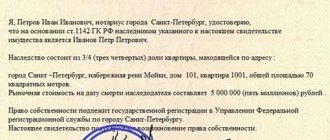2
The death of a loved one is not only a grief, but also a lot of issues related to the registration of rights to the property remaining after the death of the testator. of the 1st stage claims the property who will “cut off” everyone else, or if other relatives renounce their claims to the property.
Alas, this rarely happens and usually there is a real struggle for every asset of the deceased. Especially when the testator did not want to leave his last will in the will.
According to the general rules of the Civil Code, inheritance is carried out both by law and by will.
How is property divided if there is no will?
According to the norms of current legislation, the inheritance mass is subject to division between successors by law in the following cases:
- in the absence of a will in any form, both for the property as a whole and for its individual objects;
- in case of cancellation of the order by the testator;
- if the expression of will is declared invalid or challenged in court.
If there is no will, the inheritance of the deceased’s property is carried out legally, that is, according to the established order.
Order of priority, size of inheritance, etc.
The order of priority is regulated by Ch. 63 of the Civil Code of the Russian Federation, which defines 8 lines of inheritance based on the principle of kinship.
The first order of succession without a will includes the spouse, children, and parents of the deceased. The assignment of these persons to the 1st stage is carried out in order to protect their rights and interests, as the closest people of the testator.
If there are no immediate successors of the transferred property, then the inheritance goes to the brothers, sisters, as well as grandparents. They belong to the recipients of the 2nd stage .
The legal successors of the 3rd stage are the aunts and uncles of the deceased. And in the event of the death of the heirs, their share is transferred to their children.
Recipients of the 8th stage are the testator's dependents. These include:
- disabled and minor relatives of the deceased who were in his care;
- strangers who lived with the deceased for 1 year and ran a joint household.
Dependents independently inherit as the 8th line , however, when entering into an inheritance of any other line, they have the right to claim together with them.
Important! In the absence of heirs of the 1st priority , the transferred property is distributed among representatives of other priority. the 2nd stage are called upon to inherit first , then the next. The next queue is involved in cases where there are no heirs in the current queue or they have all refused to accept the inheritance.
Example. After the death of Ivanov N., the heir of the 1st stage was his daughter from his first marriage, Maria K. She refused to accept the inheritance, sending her refusal to a notary. Ivanov had no heirs of the 2nd stage - brothers, sisters, grandparents, so the heir of the 3rd stage - the uncle of the deceased - was called to inherit. If the daughter had not signed the renunciation of the property, calling on representatives of other lines of inheritance would not have been necessary
Who else claims to inherit without a will?
In addition to the persons indicated above, other citizens who are not directly classified in this category by current legislation may also be included in the 1st stage successors, namely:
- Adoptive parents and adopted children . According to the law, such successors have the status of blood relatives and are considered priority heirs.
- Persons who are dependent on the testator . If the deceased had a disabled relative as a dependent for 1 year
- Dependents who are not related to the testator . In order to be able to receive a part of the inherited property left by the deceased, such persons must prove the fact of cohabitation with the latter in court.
What are the rules of inheritance division?
During the division of the inheritance mass, certain rules established by current legislation must be observed.
How to divide an inheritance after death
- Any inheritance division is possible only after the death of the testator, since the inheritance is not considered open until his death. This means that it is not subject to division.
- If the inherited property passes to more than one heir, then it becomes the common shared property of such persons. This rule is valid when inheriting by law or will (without specifying the inherited person and the heirs to whom a certain thing passes).
- The provisions of the Civil Code of the Russian Federation on common shared ownership are applied to inheritance, taking into account the rules on preferential rights. Moreover, the latter apply within 3 years from the date of opening of the inheritance.
- The rules on the division of inheritance by agreement between the heirs are regulated by Art. 1165 of the Civil Code of the Russian Federation.
- The general procedure and legal conditions of this section are determined by paragraph 2 of Art. 1164 of the Civil Code of the Russian Federation, as well as the norms of Art. 252 of the Civil Code of the Russian Federation.
- The existence of preferential rights of some heirs to indivisible things and household items and furnishings is taken into account. In this case, the remaining heirs are paid compensation for the difference in the amount of inheritance shares.
- The court has the right to oblige the remaining co-owners to pay compensation to the heir even in the absence of his consent. If the inherited share of the heir is insignificant, it is impossible to actually allocate it, and the heir does not have a great interest in the use of the common property. In such actions, the courts are guided by Part 4 of Art. 252 of the Civil Code of the Russian Federation.
- Based on Art. 252 of the Civil Code of the Russian Federation, property that is in shared ownership can be divided between its participants by agreement. In the absence of an agreement on the method and conditions for dividing the common property or allocating the share of one of them, the participants in shared ownership have the right through the court to request the allocation in kind of their share from the common property.
- Citizens are given the opportunity to independently voluntarily distribute the entire inheritance among their heirs. This is done in order to prevent conflict situations regarding the division of each item. If the heirs fail to reach an agreement, the division of the inheritance is carried out in court at the request of any of them.
- The need for division of property does not arise when the testator indicates in the will exactly what property will go to which of the heirs. However, if the will does not indicate that each beneficiary will inherit from the inherited property, then most often it is necessary to make a division of the inherited property.
What property is divided during inheritance?
Exactly what property is subject to division depends on the basis of inheritance. According to the law, all inherited property is divided equally among all the heirs of the line called to inherit.
If there is a will (without specifying exact shares or in the case of allocating a mandatory share), only the property specified in the will is divided.
In fact, there are no restrictions on the division of property. The main thing is that it is not excluded from civil circulation and is not burdened with the rights of third parties.
How is property divided during inheritance according to law?
In the case of inheritance by law, division of property is possible only between those heirs who are called to inherit. Most often these are the heirs of the first stage.
Also, dependents of the testator who are unable to work on the day of opening of the inheritance have inheritance rights:
- Heirs of 2-7 queues who are not included in the circle of heirs of the queue called for inheritance.
- Other persons who from 1 year until the death of the testator were dependent on him and lived with him.
These citizens, if any, inherit together and on an equal basis with the heirs actually called to inherit. And in their absence - independently as heirs of the corresponding queue. Dependents who are not relatives of the testator are the 8th line of inheritance - Art. 1148 of the Civil Code of the Russian Federation.
How is property divided during inheritance under a will?
If the will contains clear instructions from the testator regarding the fate of his property, then problems with division do not arise, since the inheritance has already been distributed.
In the case where the inheritance is not divided by the testator, but is indicated as being transferred to several heirs, then it is assumed that it is inherited in equal shares. However, the heirs, by mutual consent, have the right to distribute the shares at their own discretion.
If the obligatory share is not taken into account, then when an interested party claims rights to it, it is separated from the inheritance mass. And the remaining property is distributed among the heirs according to the will. The obligatory share is equal to half of the part of the inheritance that would be due to the heir entitled to it in case of inheritance by law - Art. 1149 of the Civil Code of the Russian Federation.
The following may claim the obligatory share:
- Disabled or minor children of the deceased.
- Disabled parents of the testator.
- The disabled spouse of the deceased.
- Disabled dependents of the testator.
If one of the heirs under the will was deprived of inheritance rights, then his share passes to the remaining heirs under the will and is divided among them in proportion to their inheritance shares.
How is property not specified in the will divided?
Inherited property not mentioned in the will is inherited by law. This means that it is divided equally among all persons called to inherit.
First of all, the following relatives of the deceased are called upon to inherit:
- Children.
- A spouse who was legally married to the deceased at the time of his death.
- Parents.
This is enshrined in Art. 1142 of the Civil Code of the Russian Federation. If the deceased has a son, a wife and both parents, then each of them will receive ¼ of the estate not covered by the testamentary disposition.
And in their absence, the heirs of subsequent orders are called upon. In this case, the grandchildren of the deceased inherit by right of representation - Art. 1146 of the Civil Code of the Russian Federation. That is, if the testator’s child (grandchild’s parent) died before the death of the testator or at the same time as him.
What are the division methods?
The inheritance can be divided in two main ways:
- Peacefully - by oral agreement or drawing up a division agreement (in simple written form or notarial).
- If there is a dispute, go to court.
The following variations are also available:
- Shared use - with or without a definition of the order of use.
- Isolation in kind of one or more hereditary shares. Most often it is done in court.
- Transfer of indivisible things to specific heirs with the provision of monetary compensation to others.
- Exchange of an indivisible thing for several homogeneous things with the aim of distributing them among all heirs. For example, one 2-room apartment is exchanged for two 1-room apartments.
- The sale of all or part of the inheritance for the purpose of distributing the proceeds among the heirs.
To conclude an agreement you need:
- Consent of all heirs to the division and conclusion of the appropriate agreement.
- It is advisable to submit it in writing. This will protect you in the future from unscrupulous relatives and their unlawful claims.
- For the correct distribution of the hereditary mass, its preliminary assessment is required. When dividing inherited property, its market value is taken into account. Property valuation is carried out by specialized companies. The price of the service depends on the region and category of property. In St. Petersburg, you can price a car from 900 rubles.
- Since the agreement lists real estate cadastral registration data, car registration numbers, etc., it is necessary to prepare all available documentation for the inherited property. This will allow you to identify all objects of inheritance as accurately as possible. These same documents will be needed during the appraisal process.
- If the documents are not complete, then it is possible to obtain their duplicates or certificates-extracts. This is done through those institutions where the rights to the property were registered.
An agreement on the division of inheritance made with the aim of covering up another transaction with inherited property is considered void. For example, about paying the heir money or transferring property that is not part of the inheritance, in exchange for renouncing rights to the inheritance.
The transfer of all inherited property to one of the heirs with the condition that they provide compensation to the remaining heirs is regarded as a division of the inheritance only in cases where the preemptive right is exercised.
If an agreement is not reached, then division is possible only in court.
By court ruling, a forensic examination is appointed for the purpose of assessing the inherited property. This is done at the request of a party or on the initiative of the court itself. Its implementation is entrusted to an expert from one of the expert institutions in the region.
How to make a division of movable and immovable inherited property
The rules for movable property and real estate are identical. The only difference is that in relation to movable property, the provisions on indivisible things are most often applied. This means that the actual division of such things is more difficult if there is a dispute. In addition, do not forget about pre-emptive rights.
The division of inherited movable property is possible before receiving a certificate of the right to inheritance - clause 51 of the RF Supreme Court No. 9.
How to divide part of the inheritance
The heirs have the right to divide among themselves both the entire inheritance mass and any separate part of it. Thus, the rules for dividing part of the inheritance are similar to the procedure for dividing the entire inheritance.
What does judicial practice say?
Disputes about the division of inheritance, for the resolution of which Russians go to court, are mainly related to the determination and allocation of actual shares in the inheritance, as well as the implementation of preferential rights.
An example of the resolution of recent controversial legal relations is the ruling of the RF Armed Forces in case No. 8-КГ14-7. During the consideration of the case, the court determined that the exercise of the preemptive right is permissible within 3 years from the date of opening of the inheritance. And the plaintiff applied after the expiration of the specified period. In connection with this, his demands were denied.
Citizens also go to court to recognize real estate as an indivisible thing. So, in particular, a residential building that is part of the hereditary estate, the division of which in kind is impossible, can be recognized in court as an indivisible thing - clause 8 of the Review of Judicial Practice of the Armed Forces of the Russian Federation No. 2 (2019).
Amount of inheritance upon division and mandatory shares
Division of property between heirs according to law:
- Allocation of the marital share . The surviving spouse must submit an application for the allocation of his share in the common property of the spouses. He has the right to ½ share , unless otherwise provided by the marriage contract. The second part of the property and personal property of the deceased forms the estate. The allocation of a marital share does not deprive a citizen of the right to inherit.
- Division of the inheritance in equal shares between beneficiaries and dependents. Each of the legal successors of one line receives an equal share. The exception is the person in whose favor a targeted refusal has been issued by another recipient.
- The share of the deceased heir of the 1st – 3rd stage is divided between his children in equal shares . Art. 1146 of the Civil Code of the Russian Federation establishes the principle of inheritance by right of representation. Thus, the grandchildren, nephews and cousins of the deceased receive a share.
Example . After the death of citizen M., the wife, daughter, son and mother of the deceased must enter into the inheritance. The property of the deceased was an apartment and a summer cottage, acquired by him before marriage. And also a bank account for 3,000,000 rubles. The wife of citizen M. turned to a notary for the allocation of a marital share. She failed to receive part of the apartment and dacha, but she received a certificate of inheritance rights. The wife could withdraw 1,500,000 rubles. before entering into inheritance, since they are her property.
How to distribute an apartment among heirs
When transferring an inheritance to two or more citizens, and also if the testamentary document does not contain data regarding the distribution of specific property between the heirs, the specified property will belong to such persons on the right of shared ownership. As a result, several heirs acquire property rights to the same thing, for example, an apartment in shared ownership.
The specified property belongs to the category of common shared property and to allocate their share, successors can take several paths determined by law:
- enter into a voluntary agreement on the division of inherited property;
- divide the inheritance through the court;
- refuse the inheritance in favor of one of the heirs, receiving monetary compensation in return.
The third method is relevant only for cases where the heirs maintain normal relations with each other and have no conflicts or disagreements.
Is it possible to divide the inheritance by agreement?
Yes, heirs can independently determine the fate of the property due to them by law.
They can do this in 3 main ways:
- When registering an inheritance, adjusting your share with an appropriate refusal in exchange for compensation.
- After registering the inheritance, by donating, exchanging or selling your share to another heir.
- The heirs can enter into a division agreement.
Example. After the death of Alexey N., property remained - a car, an apartment and a garden plot. The heirs - son and daughter - agreed that the daughter would receive the apartment, and the son would take the garden plot and the car. The heirs entered into an agreement on the division of the inherited property, received a certificate of the right to inheritance and subsequently registered the property as determined by agreement.
Find out more about the procedure for dividing inheritance by agreement.
How does this happen?
There are four main methods that involve the actual division of inherited property between successors, including apartments, if its recipients cannot live in it together. In the optimal outcome of events, the heirs independently decide how to use the shares due to them from the received property. However, in some cases, any of these methods can be established in court.
| No. | Section options | Comments |
| 1 | Exchange | One of the heirs transfers other property to the other in exchange for a share of the inherited housing. This option has some similarities with a buyout, however, instead of cash, similar real estate, a vehicle, or even commercial equipment or premises are used. |
| 2 | Compensation | This option involves the direct purchase of a share of inherited residential real estate by reimbursing the other party for monetary compensation commensurate with the value of the transferred part of the property. |
| 3 | Isolation in kind | It is a frequently used option when dividing an inheritance, however, in relation to a property such as an apartment, it is rarely used when dividing an inheritance, due to the fact that for the real division of this property it is necessary to have separate entrances, a kitchen and a bathroom. |
| 4 | Sale | It is the simplest way out of a situation where the transferred property is not of any interest to the heirs. When using this method, an apartment or other property is subject to sale, and the funds are divided among the heirs of the rights of the deceased according to an agreement. |
All these options are possible only with the mutual intention of the heirs to divide the property. But sometimes “someone pulls, and someone resists” - so the dispute about the division of an apartment or property after an inheritance goes to court.
How to divide an inheritance without a will through court?
If the parties were unable to find a compromise on the issue of dividing shares of the inherited property, the only way to resolve this dispute is to apply to the judicial authorities by filing a statement of claim.
Procedure
In order for the process of resolving a dispute over the division of inheritance to proceed without any complications, the following algorithm of actions must be followed:
- Conduct an assessment of the transferred property , including real estate. Such actions are necessary in order to have a more specific idea of the price of the inherited property, as well as to determine the amount of state duty.
- Prepare all the necessary documents confirming the applicant’s claims, as well as draw up the text of the claim. Documentary work is best left to experienced lawyers.
- Submit a claim to the judicial authorities in accordance with all rules of jurisdiction and jurisdiction.
- Take part in the consideration of a legal dispute , as well as receive a final court decision.
- Comply with court orders.
The statement of claim is filed with the district court at the location of the inherited property. The jurisdiction of the magistrate in such cases is not provided, since the application contains a dispute about the law.
Lawsuit: content
The statement of claim for the division of inherited property must consist of the following blocks:
- The name and location of the court in which the document is being filed.
- Full name, place of residence, contact details of the parties to the case.
- The price of the statement of claim, determined based on the value of the share of the inherited property that the plaintiff claims for himself.
- A description of the current situation available at the time the claim was filed, for example, the date of death of the testator, what relationship the successors had with the deceased, actions taken to resolve the dispute peacefully.
- A statement of the applicant’s reasoned position regarding the fair division of the inheritance between all successors, with confirmation of this point of view by the evidence available in the case and the norms of the current legislation.
- The operative part of the claim, in which the applicant sets out the essence of his demands.
- List of attached documents.
- Signature and date.
The document can be submitted either in person or sent by registered mail to the court. An inventory of the contents must be included in the envelope.
Sample claim for division of inheritance without a will
Expert opinion
Stanislav Evseev
Lawyer. Experience 12 years. Specialization: civil, family, inheritance law.
Drawing up a statement of claim for the division of inherited property in the absence of a will is a very difficult task. It is better to entrust it to an experienced lawyer, who will not only competently draw up all the documents, but will also help resolve possible conflicts at the pre-trial stage.
If you are determined to file a claim on your own, you can take advantage of a free consultation with our lawyer.
Sample statement of claim for division of inheritance without a will
Documentation
Along with the statement of claim, the following necessary documents are submitted to the court:
- copies of the statement of claim for all parties to the process;
- copies of passports of participants in the trial;
- death certificate of the testator;
- a document confirming the right to inheritance;
- expert opinion on the estimated value of the inheritance;
- confirmation of payment of state duty;
- other documents that are relevant for the consideration of the dispute.
The majority of documents are submitted in copies, but be sure to take the originals with you to court. The judge may require them to be examined during the trial.
Price
Taking into account the fact that the claim for division of inheritance is of a property nature, the specified document requires an assessment. The state duty is calculated relative to the amount of claims, in accordance with the requirements of Art. 333.19 Tax Code of the Russian Federation. In addition, the plaintiff may incur costs related to assessing the value of the inherited property, as well as the services of representatives.
Dimensions and duty calculation formula
| Cost of claim (r.) | The fee is fixed (r.) | Additional percentage |
| Up to 20,000 | 4% of the claim amount but at least 400 rubles. | No additional interest |
| from 20,001 to 100,000 rub. | 800 rub. | 3% of the amount exceeding 20 thousand rubles. |
| from 100,001 to 200,000 rub. | 3200 rub. | 2% of the amount exceeding 100 thousand rubles. |
| from 200,001 to 1,000,000 rub. | 5200 rub. | 1% of the amount over 200 thousand rubles. |
| More than 1 million rubles | RUB 13,200 | 0.5% of the amount over 1 million rubles, but the duty cannot be higher than 60 thousand rubles. in total. |
Additionally, the plaintiff will have to bear expenses for:
- carrying out technical and assessment examinations;
- obtaining technical documentation for real estate;
- visits to court (if you live in another region or city);
- legal services.
The party in whose favor the decision was made will be compensated for the costs incurred. But since there is no absolute winner in such categories of cases, costs are recovered in proportion to the claims satisfied.
Deadlines
The Code of Civil Procedure of the Russian Federation determines that the total period for consideration of this category of cases cannot exceed 2 months . However, according to practice, the trial may last longer due to the request for additional evidence, the appointment of examinations and other factors delaying the court’s decision.
In this case, everything depends on the specific circumstances inherent in each individual case of division of inheritance.
The procedure for dividing inherited housing
When there is real estate, and there is more than one heir, disputes arise about the procedure for its use and disposal.
The division of real estate is carried out according to a will, or according to the general rule. Legal heirs are in an equal position.
But sometimes some have certain advantages.
Right of priority to residential premises
When a residential premises is inherited, people who lived in it before the death of the owner, in the absence of other housing, have an advantage in receiving it (Part 3 of Article 1168 of the Civil Code of the Russian Federation).
This right can only be exercised if the deceased was the sole owner. In this case, you need to pay financial compensation to the others, or transfer them other property from the inheritance.
The validity period of this opportunity is no more than 3 years. It is formalized by drawing up a written contract with other heirs or an agreement indicating the amount of compensation and the payment period.
If the heirs do not have a preemptive right
When no one has an advantage, shares in the property are distributed in turn. The living space is divided between the primary heirs, that is, children, father, mother, spouse.
If there are none, it is divided among the next line of people, and so on. You can express your disagreement in a claim.
Example of division of real estate between heirs
The heirs of the deceased Belov A.I. are his daughters Belova A.A. and Zelenova E.A.
Belova A.A. wants to take advantage of the preemptive right, since she lived with her father in an inherited apartment. He has no other housing. To do this, she filed a lawsuit against E.A. Zelenova. and Rosreestr.
Due to the fact that Belova A.A. may pay compensation to Zelenova E.A. only for 4 years and in an amount less than the share of Zelenova E.A., the court in the claim of Belova A.A. refused. The division of the apartment between the sisters will be carried out in the general manner, with ½ share each.








